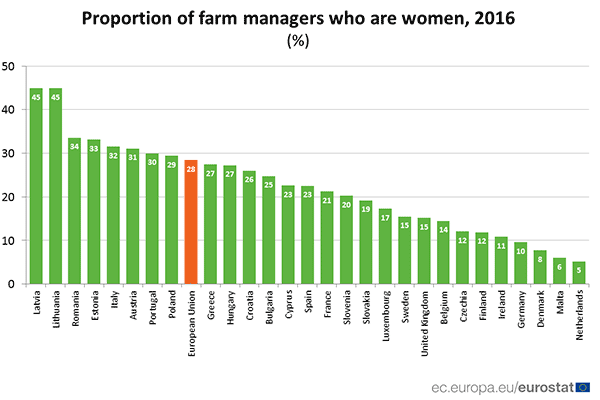
The number of women in farming has been slowly increasing in recent years. The most recent data (Eurostat 2016) suggests that, on average, around 30% of farms across the EU are managed by a woman. But data that masks some considerable differences between countries.
In Lithuania and Latvia, nearly half of all farms are managed by a woman. By contrast, in Finland, Malta, Germany, Denmark and the Netherlands the proportion of female farm managers does not exceed 10%.
This problem is particularly acute as attracting Europe’s next generation of farmers is proving to be a key challenge. Europe's farming sector is dominated by an older population and this is certainly true when it comes to female farmers – current data shows that just 4.9% of farmers are women under the age of 35. Given that almost 40% of women working in agriculture are over 65 (by contrast to just 27.6% for men), there is the potential for the gender gap in farming to widen in future years.
However, help is at hand for young women interested in a career in agriculture. Not only will the EU support new farmers through its usual income support system, it can also provide rural development funds to help young women get started in farming. This commitment to addressing the EU’s gender gap is enshrined in the Common Agricultural Policy: EU countries are required to consider the situation for women in rural areas when developing their rural development programmes.
This support has very tangible effects on the ground. In Hungary, EU rural development funding helped Zsóka Fekete to begin her own pig farm, breeding the traditional Hungarian 'mangalica' breed. These investments help protect local cultures whilst improving the competitiveness of European agriculture.
EU support for rural area has also helped Elisa Mattioli; who used rural development funding to rent 8.5 hectares of land and begin her organic fruit and vegetable enterprise. Having previously worked on her father’s farm, this allowed her to open her own business. She now sells her produce at local farmers markets in Bologna.
This International Women’s Day, the EU is not only helping to make sure that Europe’s rural areas remain competitive, vibrant and connected places to live, it is also working to make sure that the next generation of farmers better reflects Europe’s gender balance.

Source: EC